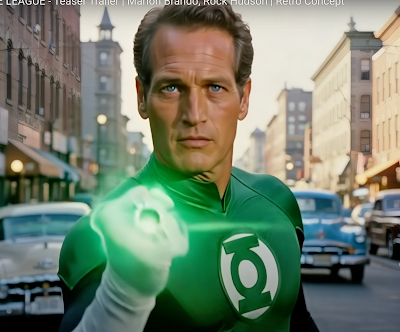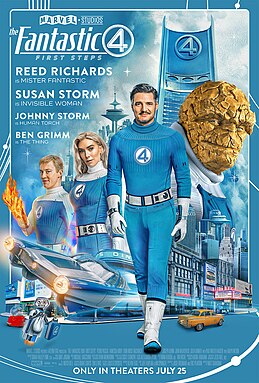AI continues to cartwheel through the arts, breaking crockery, toppling pay rates and forcing reevaluations of fundamental epistemological, ontological, and teleological truths.
Processes that began slowly with the invention of photography continued to pick up speed and today hurtle forward at a pace that leaves no time for thoughtful assimilation.

With AI, important works of art by previous generations can be cannibalized, deconstructed and seamlessly reassembled. This requires no apparent talent other than the ability to type on a keyboard. Look at how the following YouTuber can remove Cary Grant from the classic movie Charade and substitute himself as Audrey Hepburn's co-star:
Another example: a different Youtuber easily resurrects dead movie stars such as Paul Newman, Marlon Brando or Rock Hudson and makes them actors in a new movie about the Justice League:
 |
| Paul Newman as Green Lantern |
Just as inferior voices can be enhanced and corrected with AutoTune, inferior pictures can now be enhanced and corrected with algorithmic technologies. The roles of skill, creativity and imagination diminish as technology provides a colorable substitute.
All of which brings me to the new Fantastic Four movie, scheduled to be released on July 25:
Last week I saw an advance screening of the film, which is based upon the 1968 Galactus Trilogy (in Fantastic Four #48 - 50). Marvel Studios and its corporate partners employed thousands of people, hundreds of millions of dollars, and the latest software to enhance and embellish Jack Kirby's 12 cent comic book. They did everything technology could do to improve the original story.
The movie was bigger and nosier, sure, with plenty of attention-grabbing special effects, but as a work of art it couldn't compare with the power and quality of Kirby's comic book.
Kirby's dramatic staging has been replaced by high speed. His costumes have been updated, for the worse. The complexity of his content has been replaced by bland platitudes about the importance of family.

The movie is entertaining, but with all of its advantages it feels artistically inferior to the hand drawn comic book. So for those who say that traditional art forms can be replaced in all meaningful respects by new technologies, I say:
Not yet.




14 comments:
Is it just me or is that movie poster dreadful graphic design. The centered guy holds the eye for a moment, then the details disintegrate. It starts with the double "4" at the top. Not exactly Bob Peak.
The thing that jumped out at me was how wrong the heads seem for the bodies, especially the Human Torch. It looks as if the heads were cut out and pasted onto preexisting bodies, the way cheap movie posters did it in the 80s.
Welcome back! Where have you been?
My observation is that the more technology is available, the weaker the stories that are told. “Flight of the Phoenix” was so economical in its use of resources, but unmatched in its storytelling.
AI will certainly create impressive scenes. But that's more for show.
Michael Roemer
Not Bob Peak indeed. Nowhere will you see posters liked his glorious "Camelot" or even the posters of Saul Bass.
I'm sure those heads were transplanted. As AI gets better, such surgery will become less detectable.
I've been off working on a study for the National Academy of Sciences. Priorities shifted for a while.
Technology cannot make the innate meaningfulness of the world more meaningful, only more comfortable, exciting and easy. But that aint the same thing as meaningful. So it goes with art or entertainment.
That certainly seems to be the way the work is shaping up. People rely more and more heavily on the new digital crutches. Does it need to be that way? That may depend on the artist; it will require quite a substantial talent to hold their own against such powerful temptations.
chris bennett-- Does the audience notice the difference? Has our thirst for "meaning" diminished as our comfort increases?
I believe the audience does notice the difference , unconsciously. It seems to me obvious that increase in depression and despair, particularly in the young, is inversely proportional to the exponential increase of the technological and ideological fruits of the enlightenment in the recent decades.
With all the money and talent at their disposal I am astonished that Marvel chose to publish a Fantastic 4 poster that looks exactly like a marker comp from the 70s, cranked out as a rush job for an end-of-day presentation at a cut-rate agency.
To me, most AI visuals have the same bland, overly airbrushed look—like what you see on modern smart TVs. A lot of TVs now come with a video effect called “motion smoothing” or “motion interpolation” that makes movies look weirdly unnatural, almost like a soap opera. I can’t convince any of my younger friends or relatives of this. To them, it “looks fine.”
Anonymous, perhaps the reason many younger people think this stuff "looks fine" is because they are not sufficiently familiar with a grounding comparison. When you taste a fish caught hours ago that morning you realise what is lacking in its shrink-wrapped supermarket cousin.
Post a Comment